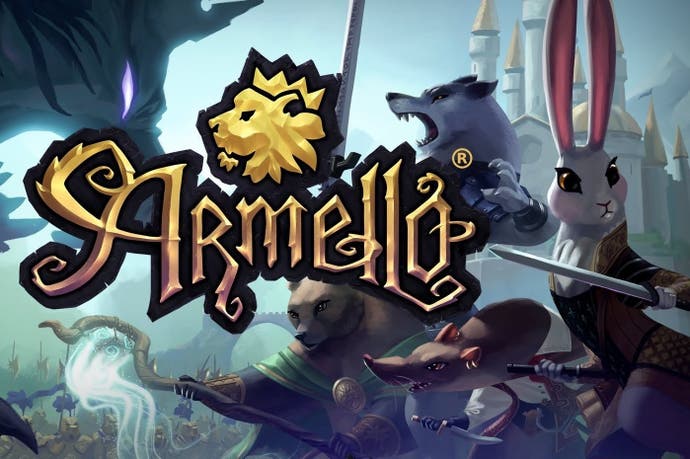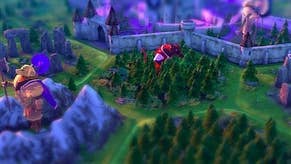Armello review
Watership smackdown.
The king is sick with rot, the fantasy kingdom of Armello's most feared disease, which drags its host deeper into madness with each passing day. One ruler's misfortune is another woodland animal's opportunity. Rather than seeking an antidote, the leaders of Armello's various furry clans - hunchback bears, lithe wolves, weaponised-parasol bearing rabbits - have instead chosen this moment to make their move for the throne. As the palace falls into disarray while the king's advisors stoically continue to implement their commander's increasingly bizarre policies, you and three other rival clan leaders engage in a complicated tussle for power, which must be resolved, one way or another, before the king's looming death.
Armello, which transposes Shakespearean power-struggles to the realm of an anthropomorphised fantasy animal kingdom, is a competitive board game with a knot of rules and systems that, while initially daunting, soon prove legible. You take turns with the other three players to move your hero around the board, which is composed of hexes that represent woods, marshes, mountains and settlements, gathering resources and might while preparing to strike.
The date of the king's death is set. If nobody attempts to overthrow the king before his natural end, the player with the most prestige will succeed him, and win the game. Prestige is won, point-by-point, by successfully carrying out heroic acts: defeating other players in battle, completing quests, or looting dungeons. There are benefits to being the 'prestige leader' (the player with the most prestige points at any given moment), even before the king's death. This character has the king's ear. Each morning, when the king awakes, he presents the trusted clan leader with two potential declarations to choose between, which will usually impact everyone in the board. In the early stages of a game they are relatively vanilla (a demand that everyone pay the crown some taxes, for example) but as the king's madness deepens, they become increasingly radical (perhaps decreeing for all of the king's guardsmen to be replaced by leathery dragons).
Being prestige leader at the time of the king's death is not the only way in which to win the game. You may also aim for the brute force of a king-slayer victory, storming the castle walls and defeating the king in battle. If your character becomes infected with the rot too, you can swing for a 'Lord of Corruption' victory, which is granted if you manage to breach the castle and kill the king while carrying a higher rot value than your opponent. Finally, players can aim for a spirit stone victory, by visiting various holy sites on the map and collecting four spirit stones, before finally entering the castle and confronting the king in order to cleanse him of his illness. The four routes to power are distinct and also flexible enough to allow a player to change tack mid-game. Indeed, sometimes a redrawing of plans is necessary. If you're infected with the rot midway through the game, you may have no choice but to adapt.
The map is relatively small - a pleasing design, as it concentrates the action, but one which the developers seem coy about, as the camera's tight focus makes it difficult to get a sense of the broader situation. The limited geography means that it won't be long before you land on a hex occupied by a rival player, or one of the king's guards, thereby triggering a battle phase. Armello uses a set of arcane dice, each side bearing a different symbol, which usually equates to either an attack strike against your opponent, or a defensive manoeuvre. The number of dice you throw is equal to you combat value. Eight combat points means that you'll throw eight dice before a battle, dictating how many attacks you can both deal and withstand during the tussle. There's a fair bit of set up to the attack phase, but once the dice are thrown, the animations rip by, revealing the outcome of the game in a few thwacks and flashes. Death is not the end. When a character dies, they simply lose a point of prestige and return to their clan grounds.
Fights are further complicated by the use of cards, exquisitely designed and animated pieces of art, which are divided into three decks: 'Items' (weapons, armour, tools and consumables that can be equipped to add further advantages in battle) 'Tricks' (traps and political manoeuvres to slow and undermine your opponents) and 'Spells' (offensive and defensive, buffs and curses.) Cards, of which there are more than 120 in the game - a balancing nightmare for the designers, no doubt - can be used during combat, or even out of turn to affect the play field. As well as swords and shields, some cards allow you to become stealthy during your next turn, or to send out scouts to uncover hidden rivals in nearby hexes. One card allows you to send false orders in order to lure the king's guard away from a particular hex. The effects, in other words, gratifyingly match the game's theme.
Armello's denizens provide you with rumours, which signal quest tiles to which you must head (ensuring that players don't loiter in one area, farming money). Once you arrive at the destination, you can either take the basic rewards and leave it there, or gamble for a greater reward, usually at the risk of losing some health points. It's a systems laden game then, with a steep learning curve (the paper prototype, reportedly, required two game masters to run) and, beyond that, a long and rising slope to mastery.
Matches take a long time to complete - sometimes upwards of an hour and, for that reason, are best played against human competitors, where one's cruelty and wisdom takes on sharper significance. That said, the AI in the single-player game is able, and for players worried about entering games via Steam matchmaking, with all the attendant risk of having a human competitor who drifts away from their keyboard half an hour in, the single-player portion provides useful on-going training grounds. Armello encourages the kind of inter-player alliance-making and treachery that's found in all the greats. Its computerised elements help make what would otherwise be a painfully protracted process of dice rolls and stat calculations in board game form palatable, and there's just the right balance between luck and tactics to ensure nobody leaves the virtual table feeling entirely robbed. And when the king is dead? Long live the king.













